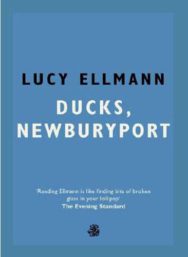Lee Randall Interviews Lucy Ellmann
‘The fact that what is it with this constant monologue in my head, the fact that why am I telling myself all this stuff.’
We don’t mind admitting that BooksfromScotland have been on tenterhooks all year for the publication of Lucy Ellmann’s new novel, Ducks, Newburyport. The more we heard about it, the more we were intrigued. So we’re so thrilled it’s now on the bookshelves, and even more thrilled that Lucy Ellmann agreed to speak to Lee Randall about her thoughts on the writing life, and particularly on the conflict between the private world of creating and the public world of promotion.
Ducks, Newburyport
By Lucy Ellmann
Published by Galley Beggars Press
Ducks, Newburyport is full of love and grief. Its 1020 pages of stream-of-consciousness plunge in and out of the lives of a middle-aged American woman and a mountain lion. I’d just finished it when Lucy Ellmann emailed to say she’d prefer to let the book speak for itself and talk instead about the custom of sending writers to public readings and book festivals.
Fine—but I predicted we were destined to disagree. Book events are my natural habitat. I programme the Granite Noir festival, on behalf of Aberdeen Performing Arts, and frequently chair book events.
Lee Randall: I was struck by the strength of your feeling that festivals and other events don’t serve writers. Why not?
Lucy Ellmann: For one thing, writers need money. If you entice writers away from their desks, at least use it as an opportunity to shove money at them. It would also be good to give them a chance to talk to each other more. I don’t think most festivals provide for that enough, except maybe in the green room, by accident.
Randall: What would constitute a useful dialogue?
Ellmann: A conference for only writers, where you have time to talk to each other about books and the book business, and how it’s all gone to pot. The collapse of the Net Book Agreement ruined things for writers. I think it made working in publishing a lot less fun, too.
I was treated really well at Bloomsbury, especially by my excellent editor there, Alexandra Pringle. But I’m getting interested in independent publishers now, because they seem more open than mainstream places to outlandish writing. My new editors at Galley Beggar are very good, and fun to work with. This novel went through a few edits.
Randall: Editing it was time-consuming, I gather.
Ellmann: Yes, it took me at least a month to reread it every time. Fourteen-hour days.
Randall: Can you talk about the book’s technical oddity?
Ellmann: The whole form arose from my current fatigue with straight narrative, which seems sort of phoney to me.
The repeated phrase, ‘the fact that’, was there from the beginning, as an emphatic refrain. But making the whole novel one sentence—that came later.
Randall: Back to festivals and bookstore appearances, aren’t they good ways of connecting with readers?
Ellmann: Sure, but my ability to connect with most people is limited—I’m shy. The ability is in the book if it is anywhere. I don’t want to get up in front of a tough crowd and try to spout my usual insane rhetoric.
People who don’t mind [events] can do them. But if it’s going to set you back for weeks, either preparing for it, or trying to get over the mess you made of it—that’s no help.
Randall: For someone introverted, unhappy with the performative end of writing—or any art form—yeah, public events would be a nightmare. My argument is that a festival tries to create a situation where writers meet people who care passionately about their work—or people who have no idea who they are, but are converted by this exposure to thinking, “Wow, I want to read all their books!”
Ellmann: Or they think, why am I listening to this one when I came to hear the other one?
Festivals need more controversy, conflict. It’s all too optimistic! I’d like a real debate once in a while, not fake ones. I don’t like it when they get too touchy-feely, every book is good, reading is good, buy this one, buy that one. It’s demeaning to books. Every book is treated the same. It’s a way of compacting you, like a crushed car. The individuality is gone.
Randall: For some, events are an antidote to the job’s loneliness.
Ellmann: Ah, but the loneliness is why I like writing. Or aloneness anyway. I am not good with people and they need to be spared me most of the time. Reading a book is totally voluntary, so I don’t feel I’m imposing myself on anybody.
Randall: Are you good with criticism?
Ellmann: It depends how much criticism. I’m pretty easily shaken. But for some reason I am kind of immune to bad reviews! What’s hard is figuring out what the next book is. But I don’t think that’s influenced by the last book’s reception all that much.
My father [biographer Richard Ellmann] once marked some essay of mine all over in red ink, and I couldn’t look at the thing ever again.
Randall: Didn’t you get your own back by editing his Oscar Wilde biography?
Ellmann: Ha ha, yeah! At his request. He was dying, and needed help finishing the book in time. I don’t think I’ve ever used editing as a weapon—yet! But you’re right, that was potentially quite a revenge moment.
Randall: Why don’t you want to talk about Ducks, Newburyport?
Ellmann: I want a book that works on so many levels that it’s hard to talk about. Besides, you’re usually wrong about your own books. You can tell people what you thought you were doing, but that’s the bombardier’s view. You don’t know what’s happening on the ground: I hit the target, or I didn’t quite hit it. Meanwhile, there’s death and devastation all around that you never have to look at. It’s up to the victims to decide what you’ve achieved. We’ll see how they feel.
Randall: Your last novel, Mimi, included a Manifesto of the Odalisque Revolution. What kind of manifesto for change would you present to the festival industry?
Elllmann: The money. It should be in the thousands. Let’s stop pussyfooting around. Writers need heat, clothing, food, a new computer every five years or so, and as much time to write as possible. This book took six years.
Create a festival just for good books, and not necessarily books published that year—why not older books? Organisers always want to promote new stuff. Why?
Or get fifty vetted people in a room with an invited writer. Really engaged people who’ve read all the writer’s books.
Randall: And in your manifesto for publishers?
Ellmann: It’s hard to say. Multiple book deals are a way of nurturing somebody—but it’s a terrible pressure for many writers. And then the publisher often feels, “Well this isn’t quite what we were hoping for,” and there’s ill feeling on both sides. I wish they’d stop bringing out début people and then dropping them because the sales figures weren’t good—the publisher needs to take some responsibility for that. They rarely publicise literary stuff enough.
Randall: You know that’s not true and lots of books sell loads of copies.
Ellmann: Hype.
Randall: How can you say publishers aren’t putting money and marketing muscle behind writers, then complain about hype?
Ellmann: What publishers call ‘literary books’ usually aren’t. More challenging novels are a minority interest, I know. But it shouldn’t all be about sales. At The New Yorker, in the old days, the money people were on a totally different floor and had nothing to do with the editorial board. You’ve got to go back to that. Editors should not have to explain to every marketer why they’re buying a book.
Randall: It strikes me you’d prefer to be an old-fashioned author, a Currer Bell, left to herself to write. The book sinks or swims without you having to do in-person promotion.
Ellmann: Yes. Anonymity might be the way to go. Or a hologram.
Ducks, Newburyport by Lucy Ellmann is published by Galley Beggars Press, priced £14.99
ALSO IN THIS ISSUE

 Finn the Little Seal
Finn the Little Seal
‘The little seal looked at the great waves as they crashed on the rocks. The big sea is far too big …

 The Best in Young Adult Fiction in 2019, So Far . . .
The Best in Young Adult Fiction in 2019, So Far . . .
‘Sometimes oor Sonny’s no the brightest. He’s lucky he’s got me tae keep him right. I tap my temple …













